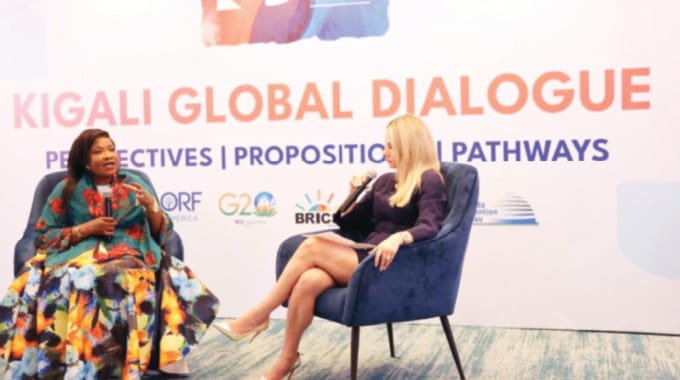Tendai Rupapa in KIGALI, Rwanda
FIRST Lady Dr Auxillia Mnangagwa on Tuesday gave the world a glimpse of the work she is doing in Zimbabwe in an interview with organisers of the Kigali Global Dialogue 3 in Rwanda.
During the interview, they touched on a wide range of issues, including the need for women in leadership positions to use their influence to elevate their peers from the grassroots.
In the interview, Mnangagwa, spelt out the importance of having women and girls pursue their education and acquire life skills.
Prior to being First Lady, Dr Mnangagwa served for four years as Member of Parliament for Chirumanzu-Zibagwe constituency in the Midlands Province.
She shared her experiences in the august house and what she learnt during her tenure.
This was after she was asked on how female parliamentarians can help shape policies.
Dr Mnangagwa said it was important for female lawmakers to fully participate in Parliament and let their voices be heard as well.
“When I went into Parliament and served for four years, what I realised first was that women Parliamentarians were not so eager to participate or to debate in parliament for fear of the unknown hence their male counterparts became more vocal than them,” she said.
“As women Parliamentarians, we are representing a demography of women out there, those who voted us to be in Parliament. When we sit in Parliament we have to talk about our people.
“That is representing them fully. That is how leadership skills come about when you debate about people you represent.”
Dr Mnangagwa, whose Angel of Hope Foundation has done incredible humanitarian work, shared in the interview the kind of initiatives she has worked on that specifically focused on women.
“I have come up with many programmes including education because I want to see every woman, the girl child, in school. I have taken all the women, regardless of where they ended their studies, back to school,” she said.
“I partnered one of the universities in my country, the Zimbabwe Open University (ZOU) to equip them with skills so that when equipped, they will be able to look after their families. They are even taught about managing businesses through business management short courses. Do they know their products, the marketing, bookkeeping? We want to instil financial discipline by stressing to them that when you are in business, it’s not like you take money and blow it, but it’s project money, business money that you have to account for and that will see you growing your business.
“Even how you look when you are selling your wares, customer care. You also have to be presentable and having good hygiene practises. So all that has come through this education for women. Further to that, we had a lot of dropouts from school from 2020 because of Covid-19.
“The under-aged girls were impregnated and the responsible men and boys ran away from them. Now I have taken them on board to train them skills, what to do and how to make their products presentable. I introduced various income generating projects for them including farming and detergent and petroleum jelly making. I gave them starterpacks to kickstart their businesses and some are now supplying big retail shops. They are now economically empowered and are able to look after themselves and their children.
“After giving birth, most of them opted for skills training instead of going back to school because they felt embarrassed. They said they feared going back to school fearing to be laughed at by their classmates, so it is better if we train them in skills so that they can fend for their babies.”
The mother of the nation eloquently gave her position on how women in leadership positions can change the landscape of policymaking.
“Leadership skills begin from where you are regardless of whether you are in rural areas or urban areas. The leadership skills should also start from there then when you are in a position that influences other women you should be seen as a woman leading and also it’s in you to go and pick up those other women at the grassroots to talk to them, strengthen them, open the doors for them to see the future and we are saying leadership in women is very important,” she said.
“We as women we have our own issues that cannot be dealt with by men. When an issue comes, be it at family level pertaining to the girl child I know quickly what to do than the men. Therefore, those leadership skills in women, be it in boardrooms, be it in Government they should pull up other women.
“They should also be the protectors and defenders of other womenfolk. So we encourage many women to work very hard and make sure that they position themselves to be in those capacities of leadership so that they also help all women.”
Women, she said, were an essential demography that needed to take up leadership positions since they occupied over 50 percent of the population.
“There is no thriving country that can go on leaving this demography of women. We need more women in those boardrooms. We have to uplift each other and encourage ourselves to work hard,” she said.
It was critical, the First Lady said, for women to work hard, go to school and pursue their dreams to lead exemplary lives.
Amai Mnangagwa decried, however, that some women and youth were less willing to make use of loan facilities offered by the Women’s Bank and Empower Bank owing to fear of the unknown and they needed to be encouraged to make use of such facilities so that they empower themselves.

